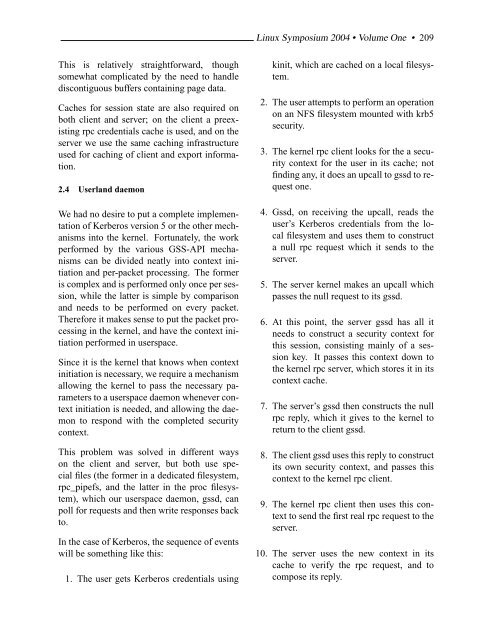Create successful ePaper yourself
Turn your PDF publications into a flip-book with our unique Google optimized e-Paper software.
<strong>Linux</strong> Symposium 2004 • Volume <strong>One</strong> • 209<br />
This is relatively straightforward, though<br />
somewhat complicated by the need to handle<br />
discontiguous buffers containing page data.<br />
Caches for session state are also required on<br />
both client and server; on the client a preexisting<br />
rpc credentials cache is used, and on the<br />
server we use the same caching infrastructure<br />
used for caching of client and export information.<br />
2.4 Userland daemon<br />
We had no desire to put a complete implementation<br />
of Kerberos version 5 or the other mechanisms<br />
into the kernel. Fortunately, the work<br />
performed by the various GSS-API mechanisms<br />
can be divided neatly into context initiation<br />
and per-packet processing. <strong>The</strong> former<br />
is complex and is performed only once per session,<br />
while the latter is simple by comparison<br />
and needs to be performed on every packet.<br />
<strong>The</strong>refore it makes sense to put the packet processing<br />
in the kernel, and have the context initiation<br />
performed in userspace.<br />
Since it is the kernel that knows when context<br />
initiation is necessary, we require a mechanism<br />
allowing the kernel to pass the necessary parameters<br />
to a userspace daemon whenever context<br />
initiation is needed, and allowing the daemon<br />
to respond with the completed security<br />
context.<br />
This problem was solved in different ways<br />
on the client and server, but both use special<br />
files (the former in a dedicated filesystem,<br />
rpc_pipefs, and the latter in the proc filesystem),<br />
which our userspace daemon, gssd, can<br />
poll for requests and then write responses back<br />
to.<br />
In the case of Kerberos, the sequence of events<br />
will be something like this:<br />
1. <strong>The</strong> user gets Kerberos credentials using<br />
kinit, which are cached on a local filesystem.<br />
2. <strong>The</strong> user attempts to perform an operation<br />
on an NFS filesystem mounted with krb5<br />
security.<br />
3. <strong>The</strong> kernel rpc client looks for the a security<br />
context for the user in its cache; not<br />
finding any, it does an upcall to gssd to request<br />
one.<br />
4. Gssd, on receiving the upcall, reads the<br />
user’s Kerberos credentials from the local<br />
filesystem and uses them to construct<br />
a null rpc request which it sends to the<br />
server.<br />
5. <strong>The</strong> server kernel makes an upcall which<br />
passes the null request to its gssd.<br />
6. At this point, the server gssd has all it<br />
needs to construct a security context for<br />
this session, consisting mainly of a session<br />
key. It passes this context down to<br />
the kernel rpc server, which stores it in its<br />
context cache.<br />
7. <strong>The</strong> server’s gssd then constructs the null<br />
rpc reply, which it gives to the kernel to<br />
return to the client gssd.<br />
8. <strong>The</strong> client gssd uses this reply to construct<br />
its own security context, and passes this<br />
context to the kernel rpc client.<br />
9. <strong>The</strong> kernel rpc client then uses this context<br />
to send the first real rpc request to the<br />
server.<br />
10. <strong>The</strong> server uses the new context in its<br />
cache to verify the rpc request, and to<br />
compose its reply.

















